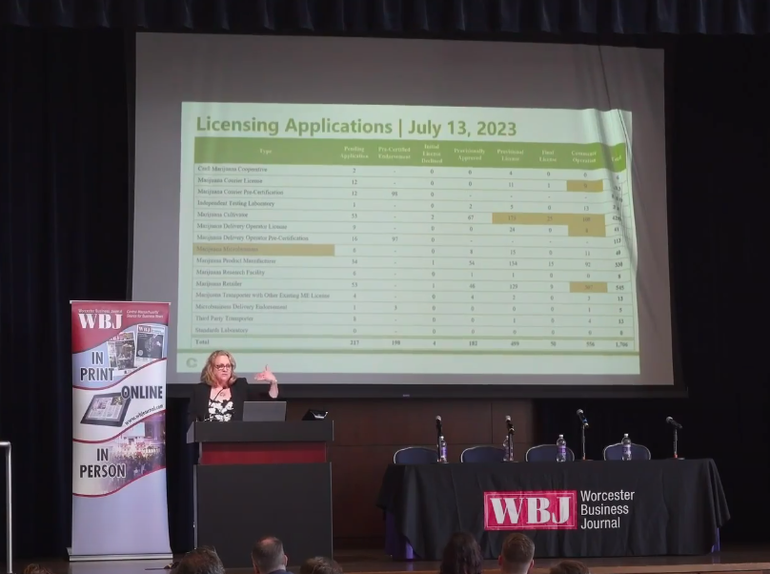Nearly six years into the full legalization of recreational cannabis in Massachusetts, dramatic changes to the marketplace will require businesses that were early entrants to double-down on their efforts to differentiate themselves, and new entrants need to position themselves differently to be profitable.
To continue to see success in the industry, companies need to differentiate themselves and become more specialized, said Shannon O’Brien, chair of the Massachusetts Cannabis Control Commission in Worcester at the WBJ Cannabis Forum in July.
Gross sales since 2018 have surpassed $5 billion, said O’Brien, but prices are now plummeting as the supply of cannabis from cultivators has increased significantly. This means entities in all areas of the growth and sale of cannabis have to reevaluate their calculations for profitability.
Operators have new challenges to confront as the industry has become more solid, said Andrew Gold, founder and CEO of Blackstone Valley Cannabis in Uxbridge.
“It’s really important to be an early entrant, but there are trade-offs,” said Gold during a panel at the forum. Operators need to relearn aspects of their operations to remain competitive.
“To be able to thrive in today’s marketplace, organizations really have to have a strategy they are committed to and focused on,” he said.
On the side of regulators at the CCC, there are changes that need to be made, too, said O’Brien. Particularly in promoting social equity, an established goal for the industry since the beginning, there’s more to do, she said.
According to CCC data, 900 individuals have benefited from equity opportunities afforded by the Mass. cannabis industry, but still people aren’t seeing the myriad benefits that were intended for people disproportionately harmed and disenfranchised by the War on Drugs, said O’Brien.
Increasingly, entities in the industry are calling on the CCC to be more transparent and reexamine some of its regulations.
“It’s high time we pivot,” said O’Brien. At six years in,it’s time for the industry to move from a startup phase to stability, she said.
Entrants and established entities in the cannabis industry also need to be prepared for how potential federal legalization of recreational marijuana will squeeze them even further, said O’Brien.
Already, more operations in the cannabis market in the northeast pose a challenge for cannabis businesses in the state. Massachusetts was the first, but is now joined by every state in New England besides New Hampshire that had legalized recreational cannabis. Changes at the federal level will exacerbate this, said O’Brien.
There are likely more challenges coming down the line, said Connor Yost, partner at Opus Consulting Group, a business development and performance consulting firm in Portland, Maine.
“There have been struggles in the industry. I don’t think we know the extent yet,” he said.

